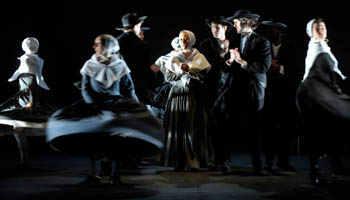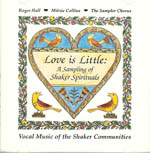
Birgit Huppuch as Mother Ann Lee and the dancers
(Photo from Martha Clarke)
Review: ANGEL REAPERS
(as performed at the Cutler Majestic Theater in Boston)
Writer: Alfred Uhry
Director: Martha Clarke
Other Credits:
Choreographed by Martha Clarke
Music director: Arthur Solari
Lights: Christopher Akerlind
Costumes: Donna ZakowskaPresenting organization: ArtsEmerson, Boston, Massachusetts
Dates: Nov. 15-20, 2011.
Company website: http://www.artsemerson.org
Stomp for Shakers?
That's the title that choreographer-director Martha Clarke jokingly called this 75 minute production, before she settled on Angel Reapers. Actually, that title may apply because there is a lot of rhythmic foot-stomping in the production which also unfortunately proceeds to "stomp" on Shaker customs and mislead the audience into thinking that the Shakers actually lived a life of constant turmoil and sexual frustration. That is mostly inaccurate.
First off, there is the problem of what to call this production. Is it "A Shaker Musical" as the publicity claimed, or a dramatic play with dancing and singing? Actually it is neither of those. Instead, it is a mixture of spoken dialogue, dance movements, and singing. There is no real story like a traditional musical or play. That is mainly the fault of multi-award winning playwright, Alfred Uhry, who doesn't build up any drama, and there is little continuity in the production. It's just a series of random scenes which feature a little spoken dialogue, some of it taken directly from Shaker writings, by the 11 member cast. But what does it all mean?
There are a number of inaccuracies in this production and it appears that the research gathering was highly selective and sloppy. For example -- the lengthy quote printed in the program and credited to "William Rathburn (circa 1805)" was actually from Valentine Rathbun, a Baptist preacher from Pittsfield, Massachusetts and his account was published in 1781, not 1805.
The most important cast member is Mother Ann Lee, incorrectly called "Shaker Eldress," which downplays her leadership of the Shaker church. She was called "Mother" because she was thought to be divinely inspired with the Christ spirit. She was portrayed by actress Birgit Huppuch, and she doesn't convey much of the compassion attributed to this revered Shaker visionary leader. Ann Lee's brother, William, is portrayed by Peter Musante, and he gets little attention. He does take part in the gratuitous naked dancing scene with other Shaker brothers. There is also a ridiculous and offensive scene involving a male and female Shaker having sex on the floor while other Shakers dance around them. The sex scene and nudity may sell more tickets but both lead the audience to believe the Shakers were mainly suffering from sexual tension or promiscuity. None of this is true. Just read any of the many books about the Shakers.
Some of the dance movements are quite distinctive and provide some needed movement in this basically static "musical." The movements are well executed by the energetic cast members. But some of the body contortions seem excessive, such as one Shaker sister standing over another one on the floor and twirling her around with her feet. For what purpose? This looks like it was intended to shock the audience and portray the Shakers as cruel.
The best part of the whole production was the singing which is strong and convincing.
Unfortunately none of the music titles are listed in the program. Why not list them?
It should be pointed out that Ann Lee and her brother William both wrote songs but none of them are featured in this production.There were over a dozen songs and hymns, beginning with the best known Shaker song, "Tis the gift to be simple," which was originally written by Elder Joseph Brackett as a dance song, yet not done that way in this production. This song and other Shaker tunes were selected and arranged by music director, Arthur Solari.
Most of the music comes from the book, shaker songs - a celebration of peace, harmony and simplicity by Christian Goodwillie (with contirbutions by Joel Cohen). Several of the titles were also some of my discoveries: "Followers of the Lamb," "In Yonder Valley" and "Woben Mesa Crelana." No credit is indicated for any of this Shaker music chosen. I attempted to write down the Shaker tunes as were sung in this Boston production. I may have missed one or two but here is the list:
"Simple Gifts" (Tis the gift to be simple)
"Followers of the Lamb" (I'm glad I am a Shaker)
"The Savior's Cheering Promise" (I will lead my chosen people)
"In Yonder Valley" (In yonder valley there grows sweet union)
Wordless dance songs (3 tunes)
"Pretty Home" (O my pretty Mother's home)
"A Companion to Old Stiff" (A companion to stiff I will not be)
"Mother's Comforting Promise" (I will comfort them that mourn)
"I never did believe"
"Woben mesa crelana"
"Stone Prison" (How can I but love my dear faithful children)
"Fall on the Rock (Fall on the rock and be ye broken)"
Most of the Shaker songs and hymns are from two highly regarded CDs: Simple Gifts and The Golden Harvest by The Boston Camerata together with other musicians including the Sabbathday Lake Shakers. The title of this production, Angel Reapers, is similar to the final song on The Golden Harvest CD. Why not include this song, "The Angel Reapers," in the production? It is a very good song and would have made an effective finale, instead of ending with complete silence without any music. Is the intent to show the Shakers were disappearing after the late 1700s? Well, that is totally incorrect because they are still here after several centuries -- the last Shaker community is at Sabbathday Lake, Maine.I read an online interview with Alfred Uhry and Martha Clarke who said they actually admired the Shakers. Then why create such a downbeat and unflattering portrayal of them?
There are other incidents from the early years which would have made a more dramatic impact, such as the famous whipping incident in 1783. There was a song written for that incident, titled "Father James's Song," [included on the CD, Love is Little] which illustrated the determination against the violent persecution they had received. As Mother Ann Lee said, "without suffering there can be no redemption."
If only there was a more positive story in Angel Reapers to go along with the intricate, well executed footwork and the sensitive singing.
Then the Shakers would have been portrayed with less "suffering" and more "redemption" in addition to all that foot-stomping.
-- Roger Lee Hall, November 21. 2011
For additional information see these links:
Joseph Brackett's 'Simple Gifts'
Music Collections and Songbooks
© 2011 PineTree Productions. All Rights Reserved.









